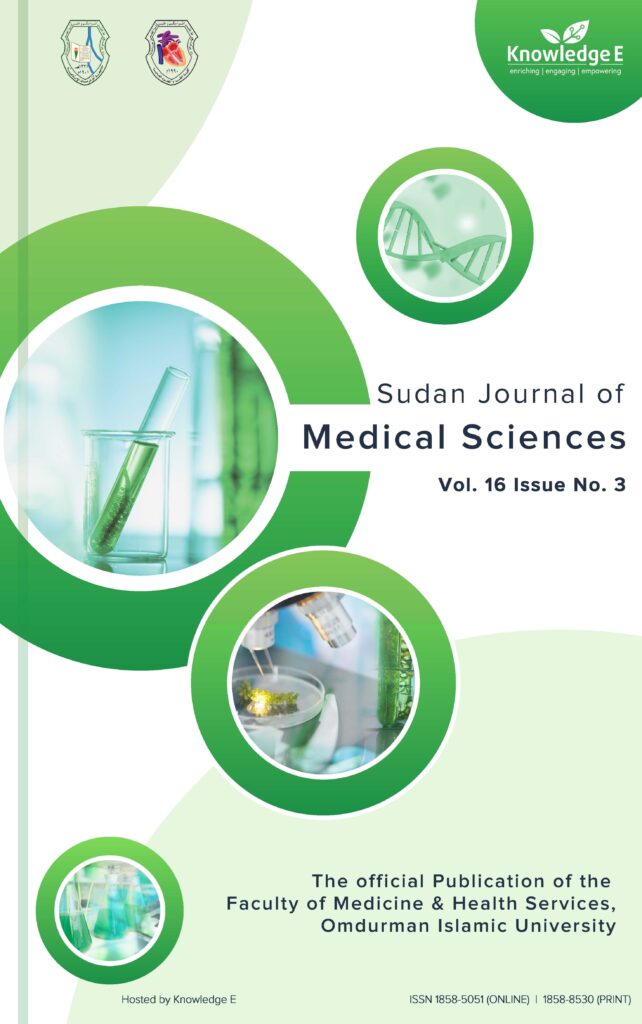
Sudan Journal of Medical Sciences
ISSN: 1858-5051
High-impact research on the latest developments in medicine and healthcare across MENA and Africa
Assessment of Plasma von Willebrand factor antigen in non-metastatic Prostate Cancerpatients: across-sectional study of the Sudanese Population
Published date:Sep 26 2019
Journal Title: Sudan Journal of Medical Sciences
Issue title: Sudan JMS: Volume 14 (2019), Issue No. 3
Pages:97 - 102
Authors:
Abstract:
Backgrounds: VonWillebrand disease (VWD) is reportedly the most common inherited bleeding disorder and can also arise as an acquired syndrome (AVWS). These disorders arise due to defects and/or deficiency of the plasma protein von Willebrand factor (VWF)..High plasma vWF concentrations have been reported in patients with various types of cancer, such as prostatic cancer.Metastasization may be associated with activation of haemostatic processes resulting in increased levels of circulating factor VIII-related antigen (FVIIIRAg) (von Willebrand factor antigen).
Objective: To evaluate the status of VWF AginSudanese patients with Prostate Cancer attending RICK
Methodology: This is a cross-sectional study carried out in Khartoum state at Khartoum oncology (RICK) hospital, during the period from April to June 2018, 45 samples were collected from patients with non-metastatic CA prostate, their ages ranged between 51 to 82 years. The vWF level was measured using Enzyme-linked immunosorbent assay (ELISA). Data were analyzed by the statistical package for social science (SPSS).
Results: Serology for vWF antigen was done for 45 cases of prostate cancer. According to the age, 2(8%) of patients with age 51-66 had a high concentration of VWF while 24(92%) had normal vWF antigen concentration; of those with age 67-82 years, 4(21%) had high vWF antigen and 15(79%) had normal antigen.
Conclusion: The study revealedthat more than 80% of Sudanese patients withnon-metastatic prostate cancer have anormal concentration of VWF.
Keywords: vWF, Prostate cancer, Age, ELISA
References:
[1] Ruggeri, Z. M. (1991). Structure and function of von Willebrand factor: relationship to von Willebrand’s disease. Mayo Clinic Proceedings, vol. 66, pp. 847–861.
[2] Sadler, J. E., Mannucci, P. M., Berntorp, E., et al. (2000). Impact, diagnosis and treatment of von Willebrand disease. Thrombosis and Haemostasis, vol. 84, pp. 160–174.
[3] Gallinaro, L., Cattini, M. G., Sztukowska, M., et al. (2008). A shorter von Willebrand factor survival in O blood group subjects explains how ABO determinants influence plasma von Willebrand factor. Blood, vol. 111, pp. 3540–3545.
[4] Shima, M., Fujimura, Y., Nishiyama, T., et al. (1995). ABO blood group genotype and plasma von Willebrand factor in normal individuals. Vox Sanguinis, vol. 68, pp. 236– 240.
[5] Lufkin, E. G., Fass, D. N., O’Fallon, W. M., et al. (1979). Increased von Willebrand factor in diabetes mellitus. Metabolism, vol. 28, pp. 63–66.
[6] Giustolisi, R., Musso, R., Cacciola, E., et al. (1984). Abnormal plasma levels of factor VIII/von Willebrand factor complex in myocardial infarction-expression of acute phase reaction or index of vascular endothelium damage? Thrombosis and Haemostasis, vol. 51, p. 408.
[7] Castillo, R., Maragall, S., Rodes, J., et al. (1977). Increased factor VIII complex and defective ristocetin-induced platelet aggregation in liver disease. Thrombosis Research, vol. 11, pp. 899–906.
[8] Sousa, N. C., Anicchino-Bizzacchi, J. M., Locatelli, M. F., et al. (2007). The relationship between ABO groups and subgroups, factor VIII and von Willebrand factor. Haematologica, vol. 92, pp. 236–239.
[9] Ablin, R. J., Bartkus, J. M., and Gonder, M. J. (1988). Immuno-quantitation of factor VIIIrelated antigen (von Willebrand factor antigen) in prostate cancer. Cancer Letters, vol. 40, pp. 283–289.
[10] Facchini, V., Gadducci, A., Baicchi, U., et al. (1988). Factor VIIIR:Ag plasma levels in patients with cervical and ovarian carcinoma. European Journal of Gynaecological Oncology, vol. 9, pp. 87–93.
[11] Gadducci, A., Baicchi, U., Marrai, R., et al. (1993). Pretreatment plasma levels of fibrinopeptide-A (FPA), D-dimer (DD), and von Willebrand factor (vWF) in patients with operable cervical cancer: influence of surgical-pathological stage, tumor size, histologic type, and lymph node status. Gynecologic Oncology, vol. 49, pp. 354–258.
[12] Sweeney, J. D., Killion, K. M., Pruet, C. F., et al. (1990). von Willebrand factor in head and neck cancer. Cancer, vol. 66, pp. 2387–2389.
[13] Paczuski, R., Bialkowska, A., Kotschy, M., et al. (1999). Von Willebrand factor in plasma of patients with advanced stages of larynx cancer. Thrombosis Research, vol. 95, pp. 197–200.
[14] Damin, D. C., Rosito, M. A., Gus, P., et al. (2002). Von Willebrand factor in colorectal cancer. International Journal of Colorectal Disease, vol. 17, pp. 42–45.
[15] Wang, W. S., Lin, J. K., Lin, T. C., et al. (2005). Plasma von Willebrand factor level as a prognostic indicator of patients with metastatic colorectal carcinoma. World J Gastroenterology, vol. 11, pp. 2166–2170.
[16] Gasic, G. J., Gasic, T. B., Galanti, N., et al. (1973). Platelet-tumor-cell interactions in mice. The role of platelets in the spread of malignant disease. International Journal of Cancer, vol. 11, pp. 704–718.